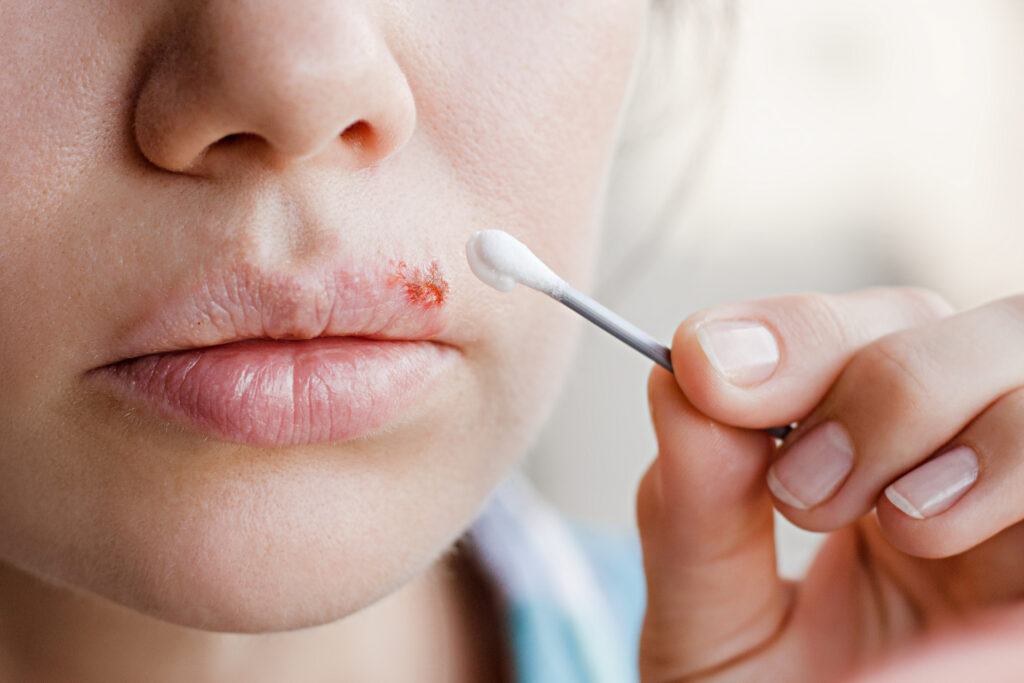
Although cold sores can be embarrassing, they are extremely common. Many people have had at least one at some point. Cold sores are caused by the herpes simplex virus type 1 (HSV-1), which is very contagious. In the United States, nearly half of Americans between the ages of 14 and 49 have HSV-1. The majority of Americans—almost 60%—have been infected with the virus by the age of 49.
If cold sores are so common, you may wonder if there is a way to prevent them. And how can they be treated if they do pop up?
What Is a Cold Sore?
A cold sore, also known as a fever blister, is a fluid-filled blister that usually appears around the mouth or on the lip. It may also appear on the cheeks, chin, or nose.
A cold sore may look similar to a canker sore, but they are different conditions with different causes. A canker sore forms inside the mouth, usually on the inside of the cheek or lips, but is not contagious. It’s also unknown what causes canker sores, while the cause of cold sores is known. Both, however, can be painful. But you can tell the difference between the two based on the location and appearance. Canker sores are usually just a single red or yellow sore with a red border inside the mouth, while cold sores are often a collection of blisters around the lips.
What Causes Cold Sores?
The herpes simplex virus causes cold sores, but certain triggers can make you more likely to develop one.
Stress
Stress can be a trigger for a lot of different conditions, and cold sores are no exception. You might get cold sores after a stressful event because stress weakens the immune system, which makes it easier for HSV-1 to reactivate. If you are constantly stressed out and getting cold sores at the same time, it might be worth looking at techniques for stress management.
Sun exposure
While soaking up the sun is one of the benefits of summertime, the sun’s rays can be harmful in several different ways. The ultraviolet rays the sun emits can lead to cold sore flare-ups. You can usually tell you’re getting one if you feel a tingling sensation above your lip after spending a day outdoors. Although the sun isn’t causing the cold sore, it can “wake up” a dormant HSV-1.
Weakened immune system
Any time our immune system is compromised, it can make fighting off infections or disease difficult. If you have a condition that weakens your immune system or take medication that suppresses it, you might be more susceptible to cold sores.
Hormonal changes
Hormones can wreak havoc on our bodies in several different ways, including with cold sores. Those who menstruate often notice they are more likely to get a cold sore when their period arrives, although certain birth control methods can help with the hormonal changes that lead to cold sores.
How To Treat Cold Sores
Most cold sores will go away on their own, but sometimes, you want to speed up the recovery process. You can treat a cold sore at home and reduce the symptoms in a few ways.
For many people, a tingling feeling above the lip is a warning sign that a cold sore is coming. Once one does appear, one of the first things you might want to do is get an antiviral medication with benzyl alcohol or docosanol. You can buy one over the counter or get a prescription from your doctor.
Another way to treat a cold sore is with ice. It won’t make the cold sore disappear, but ice can help reduce the pain and burning feeling. You can also use a cold, wet towel for a couple of minutes at a time to reduce any redness or irritation.
Using sunscreen any time you are going to be out in the sun for an extended period can reduce your odds of getting a cold sore. There are a lot of sunscreens available that are specifically for the face. Aim for SPF 30 or higher.
Practicing good hygiene can also help prevent HSV-1 from spreading to other parts of the body. Try not to touch the cold sore, and be sure to wash your hands if you do touch it.
Cold sores usually disappear on their after about two weeks. If you have cold sores longer than that, be sure to talk to your doctor or a dermatologist.
Resource List:
"Half of Americans have cold sore virus; 12 percent genital herpes" via NBC News
"Cold Sores" via Cleveland Clinic
"Cold Sore: Who Gets and Causes" via American Academy of Dermatology





